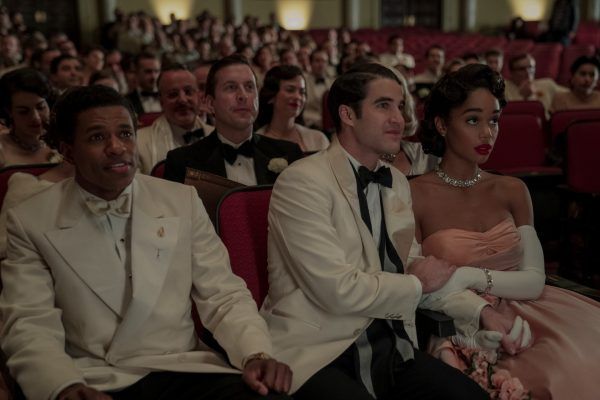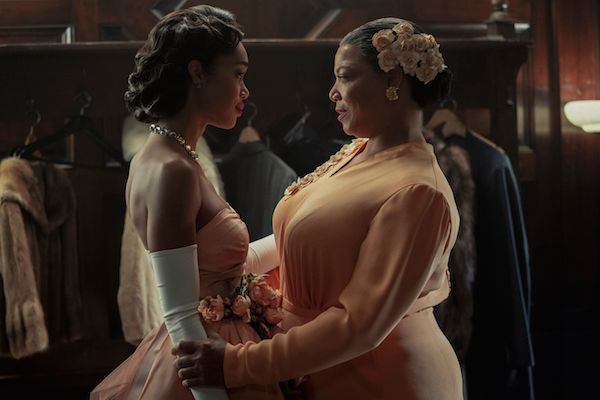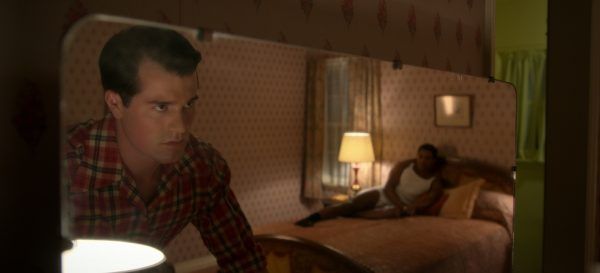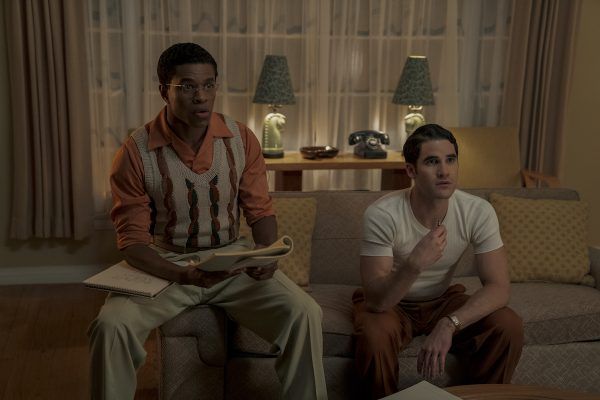It's not until perhaps midway through Hollywood that the intent behind Ryan Murphy and Ian Brennan's star-studded limited series becomes clear — to not just tell a story about the history of the Golden Age of cinema, but to rewrite it.
This brazenly optimistic take on a different kind of studio system, one that champions women, LGBTQ people, and people of color, is a beautiful fantasy, but the season ends just as the repercussions of this alternate history are just beginning to be felt. So it's worth digging into what exactly the writers of Hollywood changed about the industry, and the ripple effects that might have resulted.
Spoilers ahead for Hollywood.
The 1948 Academy Awards
The final episode of the season devotes a considerable amount of screen time to the 1948 Oscars: While in reality, no nominated film won more than three awards that night, in Hollywood, Ace Studios's Meg picks up at least seven nominations and wins in five categories, including Best Motion Picture.
Nominated alongside Meg are most of the actual films which were also in contention that year, and with the exception of Best Motion Picture, the presenter can be heard reading out all of the other nominees. This means that not only do we know who Meg's nominees were competing against, but we know who the writers removed from history:
- Best Director: The original winner in this category was Elia Kazan for Gentleman's Agreement, while Edward Dmytryk, nominated for directing Crossfire, was dropped.
- Best Actress: Loretta Young originally won for The Farmer's Daughter, while Gentleman's Agreement star Dorothy McGuire didn't make the cut.
- Best Supporting Actor: The only category where the original winner — Edmund Gwenn, who played Kris Kringle in Miracle on 34th Street — still wins. However, Jack Castello still beat out Crossfire supporting actor Robert Ryan for a nomination.
- Best Supporting Actress: Celeste Holm originally won for Gentleman's Agreement, while Ethel Barrymore for The Paradine Case was dropped for Anna May Wong.
- Best Screenplay: Archie's script for Meg beats out original winner The Bachelor and the Bobby-Soxer, and knocks out Sergio Amidei, Adolfo Franci, Cesare Giulio Viola and Cesare Zavattini, writers of the Italian film Shoeshine. Additional trivia in this category: Ruth Gordon is also nominated for co-writing A Double Life — the Rosemary's Baby/Harold and Maude star was also an accomplished screenwriter who was nominated two other times for her writing.
What's intriguing is that there's no clear explanation for any of the dropped nominees — Gentlemen's Agreement keeps both of its Best Supporting Actress nominees but loses the Best Actress nod, and Crossfire is almost but not entirely shut out of its original nominations. But the Oscars have always been fickle and hard to predict, no matter what reality you're in.
New Milestones Get Set
While Meg's victory at the Oscars broke massive milestones for the year 1948, in our reality, here's what actually happened:
- The first Asian man nominated for Best Director was Hiroshi Teshigahara for 1965's Woman In the Dunes.
- The first Asian man to win Best Director was Ang Lee for 2005's Brokeback Mountain.
- The first — and only — Asian woman to ever win an Oscar for acting is Miyoshi Umeki for 1957's Sayonara (Merle Oberon was the first Asian woman nominated in 1937, for The Dark Angel).
- As Hollywood acknowledges, in 1939 Hattie McDaniel was both the first black person to be nominated for, and win, an Oscar, for her supporting role in Gone With the Wind.
- In reality, the first African-American woman to be nominated for Best Actress was Dorothy Dandridge for 1954's Carmen Jones. The first to ever win for Best Actress was Halle Berry in 2001's Monster's Ball. (Funnily enough, one of Berry's first big breakout roles was playing the titular role in the TV miniseries Introducing Dorothy Dandridge.)
- The first African-American person to be nominated for Best Original Screenplay was Suzanne de Passe, who co-wrote Lady Sings the Blues with Chris Clark and Terence McCloy in 1972. (That same year, Lonne Elder was the first African-American man to be nominated for Best Adapted Screenplay.) Another African-American wouldn't be nominated for Best Original Screenplay until 1989, when Spike Lee's Do The Right Thing was recognized.
- The first African-American man to win for Best Original Screenplay was Jordan Peele for 2018's Get Out.
In comparison to 1948, almost all of these firsts feel insanely late — theoretically, in this better world, Meg is only the beginning for future breakthroughs.
Rock Hudson and Gay Rights
In Hollywood, being openly gay in 1948 does not do great things for the career of Rock Hudson (played by Jake Picking in the series). This means that not only do we not get the iconic Rock Hudson/Doris Day romantic comedies Pillow Talk, Lover Come Back, and Send Me No Flowers, but it's also unlikely that in 2003, Renee Zellweger and Ewan McGregor star in Down With Love, which parodied those films. (And that's a damn shame, as McGregor, in particular, is magnificent in that film.)
The finale is literally called "A Hollywood Ending," so of course Hudson eventually gets a new shot at stardom after getting cast in the gay romance Dreamland. But there is another part of his legacy in the real world that is incredibly hard to speculate about: In 1985, in our reality, Hudson was the first celebrity to die from AIDS-related complications, with his sexuality only becoming public knowledge after his death.
So much of the history of the AIDS crisis is tied up in deeply-embedded institutional homophobia and hatred. But Hollywood indicates in its final few scenes that, 1940s America has suddenly become far more accepting of gay people, who are living so openly that Henry Willson (Jim Parsons) complains that he misses "secret sodomy." In this version of reality, does that change what happens a few decades later when HIV begins to spread?
This is a massive question that Hollywood chooses not to explore. But featuring Rock Hudson in the series does inspire the question of "what if?"
An African-American Lead and "Race Pictures"
When Archie Coleman (Jeremy Pope) voices his concern that by turning the main character of his film into an African-American woman, the project becomes a "race picture," he's referring to the fact that during the first half of the 20th century, there was an active independent film scene outside of the Hollywood studio system, which made low-budget films featuring black casts.
While films by director/producers like Oscar Micheaux were popular with African-American audiences, they were never mainstream hits, and of the 500 or so films made between 1915 and 1952, only about 100 have survived to today. Hollywood never explores how the release of Meg might have affected Micheaux and others making films for this audience, but one thing that might be supposed is that with white audiences accepting an African-American lead in a studio film, "race pictures" might have been able to cross over to a brand new audience. Just another thing that Hollywood inspires us to dream about.
For more about Hollywood's alt-history, be sure to read our in-depth interview with Ryan Murphy.





